Pebbles Throws Stones
After acquiring the land for the Pebbles Mine Project in 2001, Northern Dynasty began an aggressive campaign to begin the development of what would be, once completed, the largest mineral extraction mine in the world. Along with their silent partner, Anglo-American, they pledged, in 2007, one hundred million dollars for advertising promotion. According to the Northern Dynasty website, the Pebble deposit is remarkable for both its size and composition. Current resource estimate includes 5.94 billion tonnes in the measured and indicated category containing 55 billion lb copper, 66.9 million oz gold and 3.3 billion lb molybdenum; and 4.84 billion tonnes in the inferred category, containing 25.6 billion lb copper, 40.4 million oz gold and 2.3 billion lb molybdenum. Quantities of silver, palladium and rhenium also occur in the deposit.
Northern Dynasty has not yet applied for permits, but their current proposal involves both a large open pit and an underground mine, as well as removal of the water from the headwaters of Upper Talarik Creek and the Koktuli River ( important fish habitats). The site sits at the headwaters of two major Bristol Bay drainages ( Nushagak and Kvichak), and potentially poses a large threat to the region’s water and salmon. This proposal has become a major political issue in Alaska, pitting pro-mining forces against local native villages and commercial and sport fishermen.
It’s beginning to appear that one hundred million dollars to persuade the Alaskan people as to the worthiness of this colossal endeavor is not going to be enough. Their most formidable foe is back woods flight engineer and businessman named Bob Gillam, who has allied conservationists, sportsmen, commercial fishermen and Natives to challenge an international mining consortium and Alaska’s pro-development establishment. For the mining companies in this fight, the stakes are high—billions of dollars. For Gillam and his allies, what is at stake is the future of the fish, forests and rivers of Alaska’s Bristol Bay region, which they believe are in imminent danger of destruction.
Gillam is the president of McKinley Capital Management, an international investment firm he founded in 1990. Its success has earned Gillam, who grew up in Anchorage, Fairbanks and Juneau, the title of Alaska’s richest man. With 1/10th the amount of money to launch his own campaign, which includes 80,000 bumper stickers, some television spots and a web site, his following has caused enough controversy for the Pebbles advocates to complain that Gillam isn’t fighting fairly. An anonymous site, claiming to be affiliated with the Juneau branch of the Miner’s Association asks this question, “Can one very rich man use his money to subvert Alaska’s political and regulatory processes, wound its economy, and hurt Native people throughout the state just to protect his vacation home?” The answer depends on the Alaska Public Offices commission, a state agency that oversees election laws.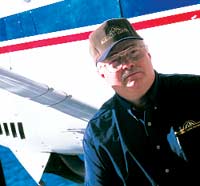
Northern Dynasty filed a court complaint against Gillam, stating he had failed to disclose the amount he’d spent on anti-Pebbles advertising. Says Gillam, ““No fines have been levied against me. Of the eight charges against me, all but two have been dropped. These two are still pending, but five-figure fines have been proposed against a group of foreign mining companies who support the Pebble Mine Project for failure to report almost $4 million spent on Ballot Measure 4 on time.”
Ballot 4 was a measure put to the vote of the Alaskan people that would place stricter regulations on large scale mining through the Clean Water Act. Although pre-election polls had shown support for the bill, it was defeated 57 to 43%. Gillam proponents blamed then- Gov. Sarah Palin who, a week before the election, declared that she was “taking off her governor’s hat” to say that she would be voting no. “It’s not a level playing field,” Gillam said. “There are very few people who can oppose them.”
Fortified by their success against the measure, Northern Dynasty extended its mining claims. On July 12, 2010, it purchased an additional 23 square miles to their roughly 163 miles of mining claims on state land to the northwest of the Pebble claims. The claims had previously been held by a much smaller mineral exploration company, Liberty Star Uranium & Metals Corp. of Arizona.
Northern Dynasty officials said they aren’t currently interested in exploring the 23 miles that they have acquired from Liberty Star. “The interest is in consolidating the Pebble land package,” said Sean Magee, a spokesman for Northern Dynasty, based in Vancouver, British Columbia. His company is the smaller of the two companies that have joined together in the effort to develop Pebble.
Pebbles mining interests propose that development of the of the project, which would be located on the east and left flanks of Mt. Iliamna, an active volcano in the range that rings the Bristol Bay, would be beneficial to the economic prosperity of Alaska. Opponents say this isn’t true. While the mine would create four to five hundred new jobs for some of the inhabitants, it would destroy the watershed that is the spawning ground for one of the last remaining areas for harvesting wild salmon. According to a 2007 University of Montana study on the economics of wild salmon watersheds, nearly 7,000 jobs depend on the salmon fishery, worth nearly $300 million per year.
Recently, the Environmental Protection Agency held a public meeting to listen to all sides of the argument concerning the development of Pebble’s Mine. Representatives of a dozen Southwest communities came forward to testify as to the threat they felt the massive project would impose on their way of life.
“If you take away who we are, our natural resources, that would be terminating us as a people,” Mary Ann Johnson from the tribal council of Portage Creek told EPA Administrator Lisa Jackson last week, during a listening session at Dillingham High School.
“The salmon have saved people from starvation,” said Dennis Andrew, of the village of New Stuyahok, noting the importance of the Bristol Bay watershed’s abundance to both people and wildlife. “It is so important that they continue to spawn in our waters.”
Among the speakers were Yu’Pik and Inuit’s whose families had inhabited the region for thousands of years. Their subsistence life styles are dependent of the fish and sea mammals in the waters of Bristol Bay and a land bountiful in wildlife and berries.
“We lead a very rich lifestyle in a resource-rich area,” said Tom Tilden, first chief of the Curyung Tribal Council in Dillingham. “We can continue to live in this area as long as the resources are protected.”
The speakers’ list ranged from Jason Metrokin, president and chief executive officer of the Bristol Bay Native Corp., to Bella Hammond of Lake Clark, widow of former Gov. Jay Hammond, who received a standing ovation.
Others included former Alaska Senate President Rick Halford, a technical advisor to Nunamta Aulukestai and Trout Unlimited; Dillingham city planner Jody Seitz, and Anchorage attorney Jeff Parker, representing the community of Nondalton.
Although the EPA listed the event as a listening device on the massive copper, gold, silver and molybdenum deposit that could be mined at the headwaters of the Bristol Bay watershed, no proponents of the Pebbles Mine project showed up.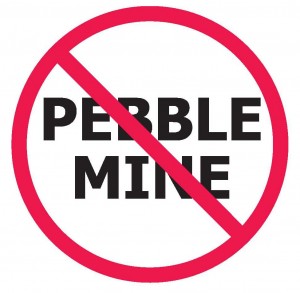
The World Needs Bristol Bay
In an interview with Michael Pollan, author of the book, “Four Fish: The Future of Last Wild Food,” Leslie Cole of “The Oregonian” asked the question, “A lot of consumers are interested in the issues surrounding wild and farmed seafood. What’s one thing most people don’t know about that they should be paying attention to?”
Pollan answered, “a much ignored problem in the lower 48 is the proposed Pebble Mine on Bristol Bay in southwest Alaska. I find it incredible that on the one hand we’re trying to speed a transgenic salmon (one that carries genes from other species) through the FDA to boost (farmed) salmon production, and on the other wing of government we’ve got support for this huge copper and gold mine project … in a seismic area. And if that berm breaks, you’ve ruined probably the most productive wild salmon grounds in the world.”
The opening of Pebbles Mine should not just be considered a US issue, but a global one. The ability to sustain a crowded population with healthy, natural foods has been limited by pollution, over-farming and industrial waste. While there are currently few options for weaning an energy hungry world away from the consumption of oil, we must question the need for mass scale development of minerals in an area more abundant with wildlife than the ANWR reserve, and more integrally a part of the ocean’s ability to sustain life.
The mining companies from England and Canada say 40 million ounces of gold and 42 billion pounds of copper wait, making it one of one of the largest copper deposits on Earth. Developing the massive gold deposits will not help the smaller mines. Gold prices have risen over the last year through demand, allowing many of the small miners to enjoy a bit of prosperity. An abundance of gold would only devalue the price. The mine’s arsenic, mercury, acid drainage and copper tailings could destroy salmon habitat, and the dam proposed to contain it in the earthquake-prone region is not enough protection.
Although Northern Dynasty insists that it is taking every precaution to create a low environmental impact, the residents of the Bristol Bay area claim they are already feeling the effects of the Pebbles exploration. They testified that activities, which include frequent helicopter flights and the presence of heavy equipment, as well as testing tools, are damaging king salmon runs and causing many animals in the Mulchatna caribou herd to migrate elsewhere.
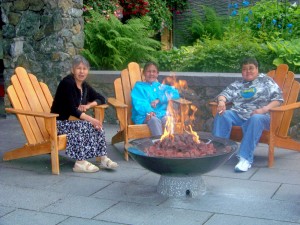
Northern Dynasty has pledged an up to $73 million in Alaska this year as part of its ongoing effort to advance the project, according to the Pebble Partnership. Despite an active advertising campaign, the inhabitants of the Bristol Bay area have said “no”. Said EPA administrator, after listening to members of the tribal Council who protested the opening of Pebbles, “there is no such thing as a choice between a job and clean water. You are entitled to both.”
The world is entitled to both, but it will have nothing if the decimation of our last renewable natural resources continue. Once we defile the pristine beauty of the Bristol Bay, we can never bring it back, we can never preserve it for future generations. Once we have disrupted the cycle of life in one of the world’s largest oceanic bread baskets, we will have destroyed all hope of being able to restore the oceans ability to create a healthy eco-system. The Alaskan people have made a choice. One hundred million in advertising is not going to change it, although the campaign continues. They are entitled to make their desires known, for this is their land, their future, their children. More importantly, the world is entitled to a place where earth can continue its natural cycles without the disruptions of modern technology weakening the overall health of our oceans. It is entitled to a chance to recover. The benefits of additional stores of copper, gold and silver by what are already the wealthiest mineral companies on the planet is not going to offset the loss of clean water and natural, healthy foods.
http://www.adn.com/2010/08/04/1395461/epa-chief-hears-mine-opponents.html
http://www.oregonlive.com/foodday/index.ssf/2010/08/state_of_four_fisheries_frames.html
http://www.adn.com/2010/07/12/1364076/pebble-partner-picks-up-some-neighboring.html
http://alaskamag.com/article/76/02/pebble_mines_formidable_foe

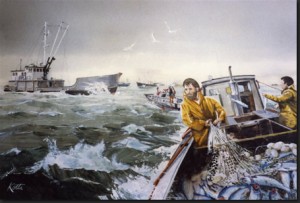
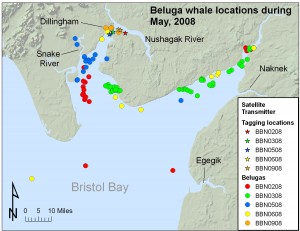
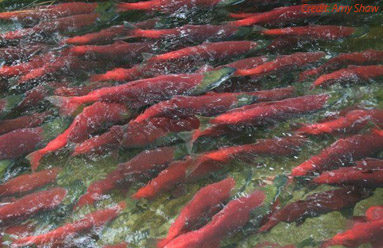
Good synopsis, as a fisherman and someone from Bristol Bay thank you for writing this. We must protect Bristol Bay for fishing families, future generations and everyone for a superfood source that is the last great wild salmon fishery on the planet.
It’s this type of raping of our natural resources by multi- national conglomerates that pisses me off. What’s it going to take to wake people up to the fact that large scale exploitation of resources is killing us all. I appreciate and admire the local grassroots efforts of peoples in stopping this potential human made environmental catastrophe and preserving our natural resources.
I think we should just all go live in caves! I’m sick of this consumer high tech world. Computers! plastics! CARS! Airplanes! Granola! Paper! Gore Tex! WHO NEEDS IT!!?? Its awful how we use all this stuff to better our lives and make us live longer and happier and keep dryer! I think we should all just drop dead and only let a few of us (me and the beautiful girl next door please) live and prosper. Decrease the surplus population buy 4 or 5 billion. Heck man, “I don’t need no stinkin’ badges!” Electricity, plumbing and copper be damned! Hell China and them thar third world countries is so messed up anyway we should just all get it from them. They don’t care do they? I mean who cares if their rivers get stuffed up…..they already are!
hah! I’m going fishin’ and I’m shootin’ anyone that comes close to me. Its my river damn it, my fish, my river, my mountains….all mine and you all simply don’t exist. Or if ya do, ya soon wont! Use a dang willow tree as a fishin’ pole, as my carbon fibre ones busted! Hell I’ll just use my hands! Go naked! live in my cave! YAH!
I’m a student trying to learn more about the green space and I really enjoyed your article. It’s absolutely worth sharing!
Verner, i’m glad you dropped in to leave a comment. With all the cry about what is already in the foods we eat, you would think the public would be more concerned about preserving the last resources of natural foods, instead of, like the terminator seed, waiting until it’s too late to do anything about it. Since the public is so sympathetic about freeing Willy, and hopefully any other whales held in captivity, i included a map of the Beluga whales migration, which have an immense fondness for the Bristol Bay and the Cook Inlet. The far northern and far southern hemispheres contain the last remaining pristine conditions. Bristol Bay and the Cook Inlet are the most viable areas on US soil for nurturing a healthy natural food basket. Only the most foolish and short-sighted would consider turning one of last remaining renewable resources into yet another waste dump for human greed.
PBugnacki, this is the problem with large industries. The silent and far more affluent partner in this venture is Anglo/American, the very company the glamorized Hollywood movie, “Blood Diamond” was made around. Glamorized the movie may have been, but it still contained some underlying truths. These companies are absolutely unconcerned with anything except profit. They will spend whatever it takes to open a mine like Pebbles because it will then give them more power and control over the world’s minerals.
Believe me, caribousteaks, all this wonderful technology won’t add to the wave of a dog’s tail if there is no natural means of replenishing the earth’s resources. There will be no fish, except the genetically modified, which will die off without adequate nourishment. The wild fish will not be able to survive. There will be no whales, no seals, no walrus, no marine life at all for the oceans will dead. There will be no agriculture other than that which depends on chemical (oil based) fertilizers, growth hormones, stimulants, genetic modifications because the earth it is grown on will contain no natural nutrients.
Elden, i salute you for your studies. There are many ways to begin acquiring more green space, but one of the first steps is in preserving the natural greenery we thankfully, already have. I’ve been communicating closely with a woman who has spent a great many years advocating bio-techniques and will be covering her experiences soon.
Brilliant research, fantastic conclusion. It’s testament to your mind and your heart that you won’t let the world forget about these issues. No one listens to mother nature as deeply and sympathetic as you. One wonders if you aren’t part tree and plant somewhere in your genetics. I hope some powerful people are taking notice of these issues….Excellent job, K!
[quote=The Late Mitchell Warren]I hope some powerful people are taking notice of these issues…[/quote]
I wouldn’t count on it – in the world of politics money and influence do all the talking and the industrial giants have cornered a monopoly on both in this market. Unless you can get some serious levergage over the political class (I’d say blackmail would be your best bet – as the special interests have all the cash and votes tied up) your only option for keeping the mining giants off your land would be force of arms.
I’m afraid Christopher is right about that one, Mitch. The powerful only listen to equal or greater power. Most Alaskans are strong environmentalists, but when ballot 4 was put up for a vote, the wording was so confusing, it was nearly impossible to tell whether you were voting for or against a bill that would put stricter controls on large scale mining development. The end result was the passage of an act that relaxed clean water regulations, allowing two very large mines; one located in Juneau, one just outside Fairbanks; to reopen, with state permission to dump their toxic waste tailings into a pristine lake and a salmon populated river.
Saying we have a voice in the decision making process is a joke. Any opposition is squashed by the personal agenda of those who only want to rape and pillage the natural resources. They do it in so many ways, but basically by passing statutes they swear were voted in by the majority, but the majority doesn’t have a clue as to what they just voted for or against. The issues become clouded, pertinent facts are covered up, and the march goes steadily on to gain complete control over the sovereignty of all people.
Americans are an accommodating people. We have been more than patient with the scum that accuse us of every evil that they themselves perpetrate. The so-called elites have had their run pounding us with the stick of multiculturalism and tolerance while we die by the thousands and watch our way of life being eroded by mass immigration of people who refuse to assimilate and expect us to accommodate their cultures and support them on welfare. While we are being taxed to death to support them, we are losing jobs to them and watching incomes decline due to competition for jobs.
If it wasn’t for your Karla, I would’ve never thought that Alaska was being cheated out of its resources. I would have continued to think that Alaska was every bit as natural as it was a century ago. The big question is…when will it all stop? The unnecessary mining of materials that aren’t even essential to life. We wonder why cancer is attacking people at a ten-fold rate. It’s because things are taken out of their natural state and transformed into unnatural by products. Thus creating contamination, pollution, and elimination of habitual elements such as the wild salmon fishery. It’s pretty sad really. Very informative piece. Thank you for sharing.
Maya, thanks for dropping in. I’ve missed you. It’s ironic. While our administrative legislation claims they are building a modern, progressive Alaska, all they are doing is mimicking the over-development and careless squandering that characterized twentieth century America. A progressive government should not repeat the same mistakes that have resulted in failure; the failure to protect lands and waters, the failure to set into place a self-sustaining infrastructure that uses its renewable resources wisely. We have the opportunity to become leaders in new technology, in energy conservation and healthy, natural food products. Instead, with absolutely no vision, our legislators have become followers of corporate mismanagement.
Wow ! That ended up being a Fantastic Post ! Thank you Very Much, As i just Bookmarked your site, Wish that you will come up with much more things like this.